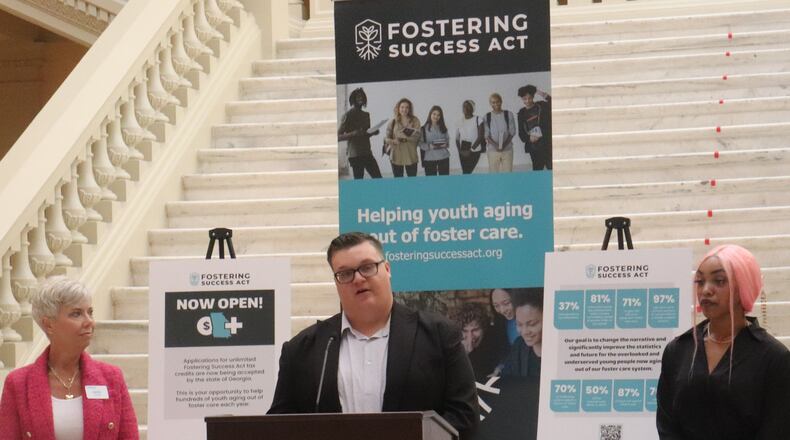Foster care advocates are calling on Georgia taxpayers to step up and take advantage of a tax credit program meant to help former foster kids.
Support for the Qualified Foster Child Donation Credit has been slow. The program took effect in 2023 and helps former foster kids who are working towards a post-high school degree. The program uses state tax credits to fund everyday costs, such as housing, transportation and food for these young people. It also helps with physical and mental health needs. Last year, it raised almost $11.6 million, but foster care advocates are concerned not enough taxpayers are aware of the program.
This year, from January through May, it has raised less than half a million in preapprovals, according to the State Department of Revenue. At a news conference held Monday at the Georgia State Capitol, Heidi Carr, executive director of Fostering Success Act, Inc., urged taxpayers to step up.
“It is critical to support youth aging out of the system, because these young adults often lack the support needed to create a clear path for success,” she said. “Most will end up on the street with no family, no job, no education and no hope, but we can change this outcome by helping to remove barriers.”
Data provided by Carr says most kids who age of the foster care system face chronic poverty and roughly one in three will face homelessness.
Carr and others at the briefing on Monday were trying to draw attention to the fact that the individual cap limits were lifted this month to help reach the annual program max of $20 million in tax credits. Because the program had not reached its cap in the first half of the year, restrictions were lifted on July 1. It’s a feature built-in to the program and happens annually if the tax credit max hasn’t been met by mid-year.
From January 1 to June 30, individual filers had a $2,500 limit. Married couples filing jointly, limited liability companies, small business corporations and partnerships had a $5,000 limit. Larger companies and trusts could give up to 10% of their Georgia tax liability. These limits were lifted on July 1 for the remainder of the tax year through December or until the program reaches its $20 million annual goal.
The program has been helping former foster youth like Michael Conger, who had not received dental care in nine years. He wound up in foster care at age 17 and aged out at 18. Now as a 25-year-old college student, he is receiving help from Carr’s nonprofit group, which is one of the organizations set up to aid both taxpayers applying for the tax credit program and former foster kids.
The donation credit program is the result of a bill Georgia lawmakers unanimously passed in 2022. The bill was seen as a win-win for state businesses and taxpayers as well as those aging out of the foster care system. Each year, about 700 young people in Georgia’s foster care system turn 18 and age out of the system. This thrusts these at-risk teens into the complications and uncertainty of adult life without traditional supports. The program funds are meant to fill in some of those gaps and offer support.
The youth eligible for the program must be Georgia residents who are pursuing some kind of post-secondary education. There could be thousands of young people across the state eligible to receive funds, Carr said.
Taxpayers, either as individuals or businesses, can apply for a dollar-for-dollar tax credit for donations made to a list of 39 state-approved non-profit organizations that are supporting these youth.
“To the legislators who passed the bill, thank you. And to those who have donated, who help former foster youth, thank you for investing in us and seeing the good in us and not allowing us to be another statistic,” Conger said. “When you’re investing in us, you’re investing in your future lawmakers and doctors and nurses and community advocates.”
Georgia taxpayers can apply for the tax credit online at fosteringsuccessact.org, or through the state’s Department of Revenue on dor.georgia.gov/.
About the Author
Keep Reading
The Latest
Featured



